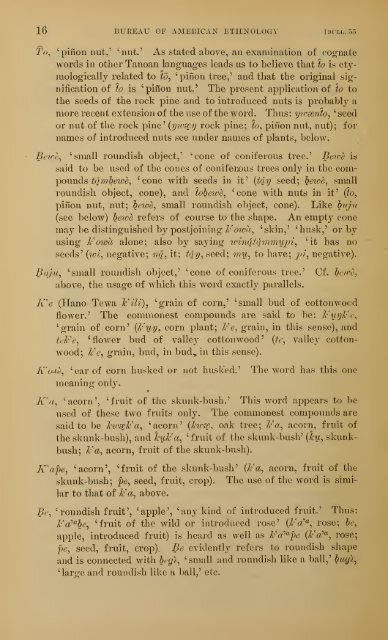Untitled - Smithsonian Institution
Untitled - Smithsonian Institution
Untitled - Smithsonian Institution
Create successful ePaper yourself
Turn your PDF publications into a flip-book with our unique Google optimized e-Paper software.
16 BUEEAU OF AMERICAN ETHNOLOGY [nnLU 55<br />
T(>^ 'pifion nut,' 'nut.' As stated above, an examination of cognate<br />
words in other Tanoan languages leads us to believe that to is ety-<br />
mologically related to to, 'pinon tree,' and that the original sig-<br />
nification of to is ' pinon nut. ' The present application of to to<br />
the seeds of the rock pine and to introduced nuts is probably a<br />
more recent extension of the use of the word. Thus: ywaento, ' seed<br />
or nut of the rock pine' {yiusey rock pine; to, piiTon nut, nut); for<br />
names of introduced nuts see under names of plants, below.<br />
^ewe, 'small roundish object,' 'cone of coniferous tree.' Bewe is<br />
said to be used of the cones of coniferous trees only in the coin-<br />
-pounds tdmhewe, 'cone with seeds in it' {tqy seed; bewe, small<br />
roundish object, cone), and iohewe, 'cone with nuts in it' {to,<br />
pinon nut, nut; ^eioe, small roundish object, cone). Like h/ju<br />
(see below) bewe refers of course to the shape. An empty cone<br />
may be distinguished by postjoining Jcowh, 'skin,' 'husk,' or by<br />
using Tcowa alone; also by saying winq^tainmnjn, 'it has no<br />
seeds' {ivi, negative; nq, it; tqy, seed; m^, to have; jn, negative).<br />
Buju, 'small roundish object,' 'cone of coniferous tree.' Cf. bcv\',<br />
above, the usage of which this word exactly parallels.<br />
ICe (Hano Tewa Vili), 'grain of corn,' 'small bud of cottonwocd<br />
flower.' The commonest compounds are said to be: I'uijVe,<br />
'grain of corn' ij^uy, corn plant; Ve, grain, in this sense), and<br />
telce, 'flower bud of valley cottonwood' {te, valley cottonwood;<br />
h'e, grain, bud, in bud,, in this sense),<br />
Ivode, 'ear of corn husked or not husked.' The word has this one<br />
meaning only.<br />
ICa, 'acorn', 'fruit of the skunk-bush.' This word appears to be<br />
used of these two fruits only. The commonest compounds are<br />
said to be MoseFa, 'acorn' {1'we§, oak tree; Ji'a, acorn, fruit of<br />
the skunk-bush), and IcyJca, ' fruit of the skunk-bush' 0iu, skunk-<br />
bush; ¥a, acorn, fruit of the skunk-bush).<br />
K'ape, 'acorn', 'fruit of the skunk-bush' {¥a, acorn, fruit of the<br />
skunk-bush; pe, seed, fruit, crop). The use of the word is simi-<br />
lar to that of k'a, above.<br />
Be, 'roundish fruit', 'apple', 'any kind of introduced fruit.' Thus:<br />
Tio'^-be^ 'fruit of the wild or introduced rose' {¥a)^, rose; be,<br />
apple, introduced fruit) is heard as well as h'a'^^fie {Fa'"', rose;<br />
pe, seed, fruit, crop). Be evidently refers to roundish shape<br />
and is connected with begl, 'small and roundishlike a ball,' &t^y^,<br />
'large and roundish like a ball,' etc.

















